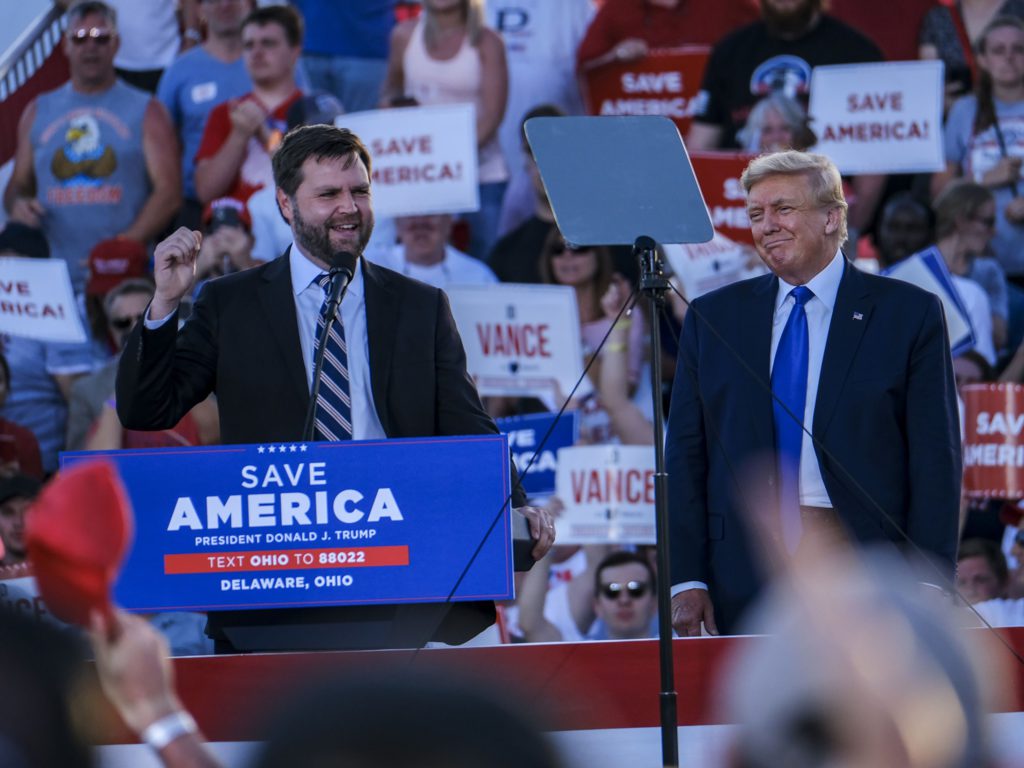(Bloomberg) — The first major test of Donald Trump’s hold on Republican voters is set for Tuesday, when a crowded and acrimonious U.S. Senate primary contest that centered largely on the former president comes to a close.
Trump endorsed venture capitalist JD Vance in a race defined by leading candidates casting themselves as standard bearers of Trump’s “America First” movement, mimicking his coarse style. But the endorsement sparked a rare public backlash from dozens of Ohio Republican officials who warned that Vance would depress Republican turnout in the general election and hand the seat to U.S. Representative Tim Ryan, the expected Democratic nominee. A major GOP group and Trump-allied conservatives like Senator Ted Cruz of Texas also campaigned for Vance’s opponents.
Ohio is the first in a series of primaries that will gauge the potency of Trump’s endorsement, an influence he is wielding to ward off potential 2024 presidential challengers, should he mount another White House campaign.
Trump has also made endorsements in high-stakes Republican U.S. Senate primary races in Pennsylvania, scheduled to take place on May 17 and in Georgia, to be held on May 24. Republicans are heavily favored to take control of the House in the November elections, with the president’s party historically losing seats during the first term.
The Senate is currently deadlocked at 50-50 and the GOP’s chances for a majority in the upper chamber are cloudier, due in part to questions about Trump-backed candidates’ statewide electability.
A Fox News poll last week showed Vance, the author of the memoir “Hillbilly Elegy,” had vaulted to the lead from third place after Trump’s endorsement, followed by former Ohio Treasurer Josh Mandel and investment banker Mike Gibbons. State Senator Matt Dolan and former Ohio Republican Party Chairwoman Jane Timken trailed the leading candidates, but a quarter of voters remained undecided.
Trump endorsed Vance’s first bid for public office, despite his past pronouncements that he was a “never-Trump guy” and questioning whether Trump would be “America’s Hitler.”
The former president held a “tele-town hall” call with supporters on Monday night to make a final pitch for Vance, saying he’s “said some negative things about me, but he’s made up for it in spades. I think I can say that he’s a thousand percent with us” — and that Vance is the best candidate to win against Democrats in the November election.
“Winning tomorrow means nothing if you’re not going to win in the general election, and JD’s going to be able to win in the general election,” Trump said.
Vance, 37 and backed by $13.5 million from billionaire Peter Thiel, said he changed his mind after seeing Trump in office. He has since adopted Trump’s false claim that President Joe Biden is a “fake president” because of widespread election fraud.
Just before Russia’s invasion of Ukraine, Vance created a furor with an attempt to channel Trump’s populist tone when he said he didn’t really care what happens to Ukraine and the U.S. needs to pay more attention to its Southern border.
Just two days before the primary, Trump couldn’t remember Vance’s name when he touted the endorsement at a rally in Nebraska. He initially misidentified him as “JP” and then called him “JD Mandel,” mixing his name with a rival.
Dozens of Ohio GOP county chairmen, state committee members and 2016 delegates for Trump urged the former president not to back Vance. Club For Growth Action, backing Mandel, has spent millions of dollars on ads showing Vance criticizing Trump.
Donald Trump Jr. campaigned alongside Vance as did Missouri Senator Josh Hawley and Representatives Marjorie Taylor Greene of Georgia and Matt Gaetz of Florida, all staunch Trump allies.
Mandel, 44, closed his campaign appearing in an ad with Cruz vowing to stop “Biden’s inflation” and held rallies with the Texas senator who rarely bucks Trump.
Mandel wooed evangelical voters and tried to establish himself as the most conservative and the most supportive of the former president. He highlighted his time as U.S. Marine, called himself “pro-God,” “pro-gun,” “pro-life,” “pro-Bitcoin” and “pro-Trump.” His closing ad leaned into culture-war fights.
Gibbons, 70, who ran unsuccessfully for the GOP Senate nomination in Ohio in 2018 and is currently endorsed by Kentucky Senator Rand Paul, rose to the top of the field after loaning his campaign more than $16 million to run ads proclaiming himself “Trump tough.” But he faltered with widely panned debate performances, including one on March 18 when he nearly came to blows with Mandel.
Dolan, 57, is the only leading candidate who didn’t court Trump’s endorsement, vying instead for centrist Republicans. A poll conducted April 29 through Sunday by the Trafalgar Group showed Dolan surging into second place behind Vance, 26.2% to 22%, with Mandel third at 20.8%. Dolan’s family owns the Cleveland Guardians baseball team and he’s spending $10.6 million of his own money.
Timken, who was endorsed by Portman, hopes that her get-out-the-vote operation will be decisive in a low-turnout primary. She portrayed herself as a “mom on a mission” who had Trump’s backing to take over the state GOP in 2017, but polls show that she hasn’t risen into the top tier of candidates.
Ryan is running against former Consumer Financial Protection Bureau lawyer Morgan Harper and information technology executive Traci Johnson.
(Updates with Trump comments, in eight and ninth paragraphs.)
More stories like this are available on bloomberg.com
©2022 Bloomberg L.P.











